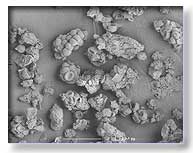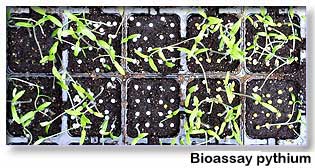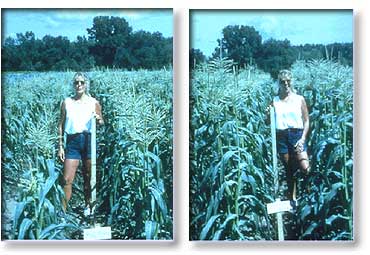asic principle of this research project is
that
INCOTEC
will not be a producer of biological agents.
Incotecís core
business in this respect is to combine living seeds with a living
antagonist.
The specific know-how of producing these antagonists
will be left to the companies who are specialized in these technologies.
INCOTEC, however, does have close contacts with these producers of
biologicals. Very close cooperation with
BioWorks,
Inc, producer of a
unique Trichoderma strain, even resulted in an exclusive agreement
for this agent for application on Sweet Corn.
 DISCO Care
DISCO Care
The introduction of DISCO Care is the first
major achievement in a series of new products to come. This new film coat
formulation enables seed companies/growers all around the world to coat
their (Super) Sweet Corn with this beneficial microorganism Trichoderma.
When coating your seeds with this product a precise dosage of Trichoderma,
combined with chemical crop protection agents, is evenly applied to the seed


About
Trichoderma
Trichoderma is one of the
first EPA-registered biofungicides.
The Trichoderma will colonize the roots of the
corn plant just after germination and together they will form a symbiosis.
Both the Trichoderma and the corn plant benefit from this
co-operation. The Trichoderma retrieves nutrients leaching from the
corn roots.
 The fungus releases growth regulators that
enhance and stimulate root branching of the corn plant to grow faster and
more vigorously. Trichoderma promotes the development of a larger
and healthier root system. This increased root mass results in a higher
nutrient uptake and will, therefore, result in higher yields.
The fungus releases growth regulators that
enhance and stimulate root branching of the corn plant to grow faster and
more vigorously. Trichoderma promotes the development of a larger
and healthier root system. This increased root mass results in a higher
nutrient uptake and will, therefore, result in higher yields.
Moreover Trichoderma protects
the root system against soil pathogens, like Pythium, Fusarium,
Scleroctinia and Rhizoctonia. Trichoderma wonít
control Phytophtora.
 Trichoderma
is compatible with
a broad spectrum of regular chemical crop protection agents.
Trichoderma
is compatible with
a broad spectrum of regular chemical crop protection agents.
Trichoderma
cannot improve already-optimal growing conditions. However, it
might not be suitable for all growers in all conditions, but especially on
less fertile soils, the growth stimulating effect is apparent.
Trichoderma
has particularly proven to be very beneficial under dry conditions.
Developing New
Biological Seed Treatments
Developing new seed treatments with biologicals is not
that simple. Not all biological agents are just suitable for seed
treatment. To make the seed treatment process feasible, the particle size
of the material containing the spores of the
agent should be very small. Furthermore a high CFU count is needed (CFU
= Colony Forming Unit) and the material can not be contaminated with other
microorganisms. For long term survival the biological also needs to be
desiccation-tolerant.
Extensive research and selection of the right antagonist
is needed to come to a new biological seed treatment. A number of tests
are available at Incotec to enable us to come to the most efficient
combination of seed, biological and application method. We strive after
all for a product with the most optimal field performance.
Tests that are used during the research phase include:
By standard dilution plating of the used formulation,
the number of colony forming units can easily be determined. We analyze
this before and after the coating process. In this way we can measure
the survival of the biological during our coating process. With this test we can also examine
the shelf life of the biological agent after it is coated on the seeds.
 Biological
treated seeds are sown on an artificially pathogen infested soil (for
example Pythium). The plantlets which are well colonized by the
biological will grow nicely whereas the plantlets without a biological
have a higher chance to die. In this way we can determine the efficacy of
a biological to control certain soil borne pathogens.
Biological
treated seeds are sown on an artificially pathogen infested soil (for
example Pythium). The plantlets which are well colonized by the
biological will grow nicely whereas the plantlets without a biological
have a higher chance to die. In this way we can determine the efficacy of
a biological to control certain soil borne pathogens.
Plants are grown in the greenhouse on specific potting
mixtures. After a certain period the roots are harvested and almost all
the potting mix is removed. With dilution plating the amount of spores
(cfuís) can be determined per gram of root tissue. The cfu count gives
you information about the ability of a biological to grow with the root
system. Besides this quantitative test we also can test the presence of
the biological on the roots by putting different parts of the roots on
plate.
For biological seed treatments it is very important to
know which pesticides are compatible with the beneficial microorganism
coated on the seeds. Using in vitro growth tests we can determine which
pesticides can be used in combination with biologicals.
 Biologicals are living organisms that are very
vulnerable, even when they are in a dry quiescent state. During the coating
process the spores are physiologically activated because of the presence
of water. After the
coating process the treated seeds are dried, including the spores. They are
returned into their dry quiescent state. By optimization of the coating
process the viability of the spores can be maintained on a very high
level.
Biologicals are living organisms that are very
vulnerable, even when they are in a dry quiescent state. During the coating
process the spores are physiologically activated because of the presence
of water. After the
coating process the treated seeds are dried, including the spores. They are
returned into their dry quiescent state. By optimization of the coating
process the viability of the spores can be maintained on a very high
level.
Finally our biological seed treatment is tested in the
greenhouse and in field trials. Yield measurements are made to analyze the
economical value of our biological seed treatment.
With the introduction of Trichoderma on (Super)
Sweet Corn being a fact, our research priorities are pointed towards new
crops and new biologicals. We will be prepared for the future.